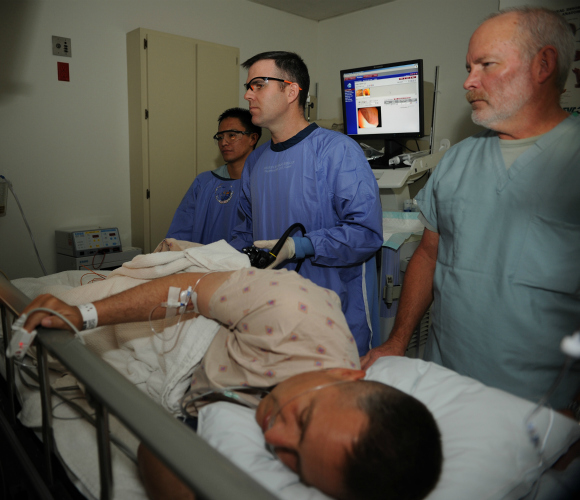“There is a social stigma regarding tests like these in the Asian communities.”
When it comes to men and healthcare, the numbers don’t lie.
Compared to women, men are 24 per cent less likely to visit their doctors for routine tests and 22 per cent less likely to get their cholesterol checked.
Men are less willing to be screened for cancer, despite the fact that their cancer mortality rates are higher.
Some are stubborn because they don’t want to believe that something can be wrong, and afraid because they fear that something might actually be wrong.
However, it is still risky to skip routine screenings and health checks as it’s better to catch something early then later and regret it.
DESIblitz recommends six routine health checks men should perform.
Blood Pressure Test

A routine blood pressure screening is one of the easiest, most painless things you can do for your health. It’s so simple, in fact, that there’s just no excuse not to do it.
You often don’t even need to go to the doctor, as many pharmacies now have machines that can check your blood pressure in store, or over the counter mostly.
The National Institute of Health currently recommends that men between the ages of 18 and 64 be screened at least once every two years, but your doctor may advise more frequent tests depending on your reading.
If your readings are high, your doctor can suggest simple lifestyle changes to decrease them, such as putting you on a salt-restricted diet.
Simran, a medicine student, says: “Exercise and weight loss are two excellent interventions that work great to lower blood pressure, it’s important to get those optimal numbers.”
Prostate Cancer Screening
This particular test has been the subject of a few controversy recently, in part because of concern over the possibility of false positives and over-treatment. However, many experts say men should still be tested.
The main method of screening for Prostate Cancer is the PSA (prostate specific antigen) test, which measures the level of PSA in your blood.
Positive levels are usually considered to be under 4 ng/mL, nanogram per millilitre.
Consult your doctor to confirm whether or not PSA is the right method for you, as there is another unconventional method.
The Digital Rectal exam involves the doctor physically checking your rectum for signs of cancer.
Opinions may vary for how often you should get tested, so consult your doctor for a tailored schedule.
Aamir, a human biology student, tells us: “There is a social stigma regarding tests like these especially in the Asian communities, but I’m glad my dad got tested, because they caught his cancer early and was able to treat him.”
Cholesterol Test

A cholesterol check is also simple and vital to overall heart health as you age.
Measured with a simple blood test, cholesterol screenings for men’s health are recommended every five years.
You may need them more often if you are over 45, at high risk for heart disease, or have high levels of ‘bad’ LDL cholesterol or low levels of ‘good’ HDL cholesterol.
Good levels of cholesterol is less than 200 milligrams per deciliter, but the ratio is important as well.
Simran explains: “If a patient has an elevated total cholesterol and a very high HDL mg/dL, we may consider the total cholesterol elevation irrelevant.”
In addition, optimal LDL is under 100 mg/dL, but that some laboratories consider up to 130 mg/dL acceptable. The optimal triglyceride level is under 150 mg/dL.
Skin Cancer Check

Men are actually two to three times more likely to get non-melanoma basal cell and squamous cell skin cancers then women.
Their risk increases as lifetime exposure to sun accumulates.
About every three months, men should do a self-examination for new or changing skin lesions, just to prevent other skin related problems as well.
Nasir, a Tesco worker, says: “I’ve had cancer twice on my hands and I’ve been lucky to catch it quick just by noticing the colour change in my skin. I recommend regular check ups.”
Also be sure to ask your doctor to check your skin, head to toe, during your yearly physical as part of regular preventive care.
Diabetes Test

Uncontrolled diabetes can lead many health related issues, such as heart disease and stroke, kidney disease, blindness from retinal damage, nerve problems and impotence.
Most men suffer from these conditions and don’t even know how it all started.
If you show some symptoms of diabetes, your doctor will probably run a routine blood test, known as a fasting plasma glucose test.
If results come back greater than or equal to 126 mg/dL on two separate tests, you may have Type 2 diabetes.
If your family has a history of diabetes, consult with your doctor to see how often you should be tested.
Hamza, a media student, says: “Having many people in my family that suffer from this condition, I decided to get tested.
“Then I learnt that I have the gene, which lead me to change my lifestyle choices and what I ate. I’m glad I know so I can prevent it.”
Colon Cancer Screening

There are several routine testing options for colon cancer. A colonoscopy, for example, involves checking the entire colon with a camera using a flexible tube.
A flexible sigmoidoscopy is similar, but checks just the lower third of the colon.
A CT colonography is a less invasive test that examines the colon using computerised tomography, or a CT scan.
A double-contrast barium enema involves filling the colon with a contrasting substance that will help doctors see problems on an X-ray.
Men aged 50 and over should receive:
- A flexible sigmoidoscopy every five years
- A colonoscopy every 10 years
- A double-contrast barium enema every five years; or
- A CT colonography every five years.
Again, these would differ if you are a higher risk of getting colon cancer or have family history of cancer.
Always consult your local surgeon or doctor before getting tested frequently.
Don’t let fear keep you from getting these important health checks done. Illnesses are easier to treat and respond better to treatment if picked up at an early stage.































































